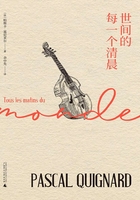“I don’t attempt to do so. I would only observe that there isa certain method in the gentleman’s eccentric proceedings. Forexample, in Dr. Barnicot’s hall, where a sound might arouse thefamily, the bust was taken outside before being broken, whereasin the surgery, where there was less danger of an alarm, it wassmashed where it stood. The affair seems absurdly trifling, andyet I dare call nothing trivial when I reflect that some of mymost classic cases have had the least promising commencement.
You will remember, Watson, how the dreadful business of theAbernetty family was first brought to my notice by the depthwhich the parsley had sunk into the butter upon a hot day. I can’tafford, therefore, to smile at your three broken busts, Lestrade,and I shall be very much obliged to you if you will let me hear ofany fresh development of so singular a chain of events.”
The development for which my friend had asked came in aquicker and an infinitely more tragic form than he could haveimagined. I was still dressing in my bedroom next morning, whenthere was a tap at the door and Holmes entered, a telegram in hishand. He read it aloud:
“Come instantly, 131 Pitt Street, Kensington.
“LESTRADE.”
“What is it, then?” I asked.
“Don’t know—may be anything. But I suspect it is the sequel ofthe story of the statues. In that case our friend the image-breakerhas begun operations in another quarter of London. There’s coffeeon the table, Watson, and I have a cab at the door.”
In half an hour we had reached Pitt Street, a quiet littlebackwater just beside one of the briskest currents of London life.
No. 131 was one of a row, all flat-chested, respectable, and mostunromantic dwellings. As we drove up, we found the railings infront of the house lined by a curious crowd. Holmes whistled.
984 The Complete Sherlock Holmes
“By George! It’s attempted murder at the least. Nothing less willhold the London message-boy. There’s a deed of violence indicatedin that fellow’s round shoulders and outstretched neck. What’sthis, Watson? The top steps swilled down and the other ones dry.
Footsteps enough, anyhow! Well, well, there’s Lestrade at the frontwindow, and we shall soon know all about it.”
The official received us with a very grave face and showed usinto a sitting-room, where an exceedingly unkempt and agitatedelderly man, clad in a flannel dressing-gown, was pacing up anddown. He was introduced to us as the owner of the house—Mr.
Horace Harker, of the Central Press Syndicate.
“It’s the Napoleon bust business again,” said Lestrade. “Youseemed interested last night, Mr. Holmes, so I thought perhapsyou would be glad to be present now that the affair has taken avery much graver turn.”
“What has it turned to, then?”
“To murder. Mr. Harker, will you tell these gentlemen exactlywhat has occurred?”
The man in the dressing-gown turned upon us with a mostmelancholy face.
“It’s an extraordinary thing,” said he, “that all my life I havebeen collecting other people’s news, and now that a real piece ofnews has come my own way I am so confused and bothered that Ican’t put two words together. If I had come in here as a journalist,should have interviewed myself and had two columns in everyevening paper. As it is, I am giving away valuable copy by tellingmy story over and over to a string of different people, and I canmake no use of it myself. However, I’ve heard your name, Mr.
Sherlock Holmes, and if you’ll only explain this queer business, Ishall be paid for my trouble in telling you the story.”
Holmes sat down and listened.
“It all seems to centre round that bust of Napoleon which Ibought for this very room about four months ago. I picked it upcheap from Harding Brothers, two doors from the High StreetStation. A great deal of my journalistic work is done at night,and I often write until the early morning. So it was to-day. I wassitting in my den, which is at the back of the top of the house,about three o’clock, when I was convinced that I heard somesounds downstairs. I listened, but they were not repeated, and Iconcluded that they came from outside. Then suddenly, about fiveminutes later, there came a most horrible yell—the most dreadfulsound, Mr. Holmes, that ever I heard. It will ring in my ears aslong as I live. I sat frozen with horror for a minute or two. Then Iseized the poker and went downstairs. When I entered this roomfound the window wide open, and I at once observed that theThe Return of Sherlock Holmes 985
bust was gone from the mantelpiece. Why any burglar should takesuch a thing passes my understanding, for it was only a plaster castand of no real value whatever.
“You can see for yourself that anyone going out through thatopen window could reach the front doorstep by taking a longstride. This was clearly what the burglar had done, so I went roundand opened the door. Stepping out into the dark, I nearly fell overa dead man, who was lying there. I ran back for a light and therewas the poor fellow, a great gash in his throat and the whole placeswimming in blood. He lay on his back, his knees drawn up, andhis mouth horribly open. I shall see him in my dreams. I had justtime to blow on my police-whistle, and then I must have fainted,for I knew nothing more until I found the policeman standingover me in the hall.”
“Well, who was the murdered man?” asked Holmes.
“There’s nothing to show who he was,” said Lestrade. “Youshall see the body at the mortuary, but we have made nothing ofit up to now. He is a tall man, sunburned, very powerful, not morethan thirty. He is poorly dressed, and yet does not appear to be alabourer. A horn-handled clasp knife was lying in a pool of bloodbeside him. Whether it was the weapon which did the deed,or whether it belonged to the dead man, I do not know. Therewas no name on his clothing, and nothing in his pockets save anapple, some string, a shilling map of London, and a photograph.
Here it is.
It was evidently taken by a snapshot from a small camera.














